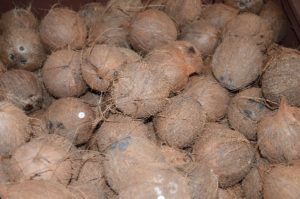 Nigerian farmers can tap into the $4billion global coconut market to earn foreign exchange in the face of an acute dollar shortage that has thrown Africa’s biggest oil producer into recession.
Nigerian farmers can tap into the $4billion global coconut market to earn foreign exchange in the face of an acute dollar shortage that has thrown Africa’s biggest oil producer into recession.Coconut is a cash crop that is grown in 22 of Nigeria’s 36 states, with Lagos State having the largest production area. The crop serves as a raw material for numerous industries such as the pharmaceutical, costmestics and food and beverage with limitless domestic and export potential.
The most sought-after component of the fruit is coconut water, which is very rich in potassium and other electrolytes, is considered a health drink and recommended for diabetes patients among others.
“It is a great opportunity that farmers can tap into, especially now that the country is in need of dollars,” Mufutau Akinlolu, president, Coconut Growers Association in Badagry, told BusinessDay in a telephone interview.
“The government needs to invest in new trees and fertilisers to increase yield per hectare and also in the value chain. There is very little investment in coconut processing currently,” Akinlolu said.
Akinlolu stated that for the country to increase its production of the coconut crop, the government must address the issue of land acquisition, which he noted is the biggest challenge confronting farmers.
Despite the potential of the crop, the country is yet to fully harness the economic benefits from growing coconut, on account of ageing trees and low quality seeds, say experts.
“Most of the coconut trees in the country are ageing and there is a need for their replacement,” Akinlolu added.
Nigeria produced about 267,520 metric tonnes of coconuts in 2014 and occupying 18 position of the world coconut production index, according to data obtained from The Food and Agricultural Organisation (FOA).
Coir, which is the fiber from coconut husk, is used in making ropes, rugs, mats, brushes, sacks, caulking for boats and stuffing for fiber mattresses.
The fronds (leaves) are used for brooms, cooking skewers, woven into mats or burnt to ash to yield lime. Husk and shells are a source of charcoal and can be used for fuel.
Clestine Ikuenobe, director of research, Nigeria Institute for Oil Palm Research (NIFOR) said, “It is a crop in which the country should exploit its comparative advantage because it can be grown in 22 states. It grows very well mostly in coastal regions.”
Ikuenobe told BusinessDay that the country would soon see new investments in the cultivation and production of the coconut in Cross River State, adding that the institute had already been contacted by a group of the new investors. He added that the investors had approached the institute to develop hybid coconut seeds.
He said traders are already exporting the crop on a very small scale, calling on the government to assist in boosting the production of the crop to enable it earn foreign exchange for the country, especially now that the government is focused on diversifying its revenue through agriculture.
According to Ikuenobe, there are hybrid varieties of coconut now that mature and bear fruit in between two and three years.
Currently, the global price of coconut oil has jumped more than 50 percent in the last 12 months on surging demand.
The increased demand for coconut is being felt across industries that exploit it as raw materials, suggesting that the price of the crop is not likely to drop significantly in the near future, analysts say.
The price of the crop has increased by 3 percent fom $1,508 in July to an average of $1,547 per metric ton in September, according to data obtained from Index Mundi.
Currently, farmers in top coconut producing countries, especially in the Caribbean, are struggling to meet export demand.
The Wall Street Journal (WSJ) reports that the global consumption of coconut water has increased by 13 percent from 2014 to 2015, following a 24 percent increase the previous year.
Despite economic numbers showing recession, Nigeria’s agricultural sector grew by 13.2 percent year –on- year in nominal terms.
The general manager of Lagos State Coconut Development Authority (LACOSDA) did not comment on questions regarding coconut production in the state.











